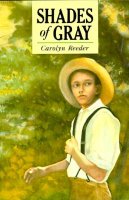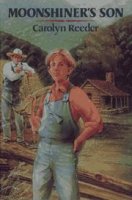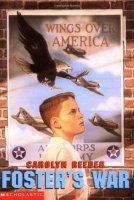


Shades of Gray by Carolyn Reeder (MacMillan, 1989)
Moonshiner's Son by Carolyn Reeder (MacMillan, 1993)
Foster's War by Carolyn Reeder (MacMillan, 1998)
My oldest grandson recommended Shades of Gray to his mother, who recommended it to me; now I'm recommending it to you. Jonathan eats dense, thousand-page books for breakfast, so this 152-page historical novel must have been no more than a gulp for him, but I'm glad to say that he—like his mother and grandmother—is not too proud to enjoy a good book at any level. These three books are all our library has to offer of Reeder's many offerings.
Shades of Gray is a tale of post-Civil War Virginia, told with sensitivity and, as far as I can tell, historical accuracy. There are difficult moments, and times of courage; of returning good for evil, and standing up for one's beliefs, and recognizing the humanity of someone with whom one disagrees. For all this good edcational value, it's also a great story.
Moonshiner's Son is likewise, and gives a whole new appreciation for Appalachian Mountain culture and several sides of our country's well-meaning, but foolish, experiment with Prohibition.
About Foster's War I can't be so enthusiastic, perhaps because I read it last, but more because it is by far the darkest of the three. Again, there are good moments and bad, and a sensitive treatment of the challenges faced by families living in Southern California at the start of World War II. But it's grim.
Although in all three cases the main character is a boy, I can commend the author for the strong female characters she also includes. What distresses me is my suspicion that she may be working out problems she has had with men in her own life. Three books; three boys afraid of the father or father-figure in their lives, and desperately seeking approval. In Foster's War, the father is downright abusive to his whole family, which tiptoes around trying to avoid "setting him off." Plus, in that book there's a lot more of what I don't like about so many modern children's books: disrespect between siblings, and from older children to younger.
I do like that in Foster's War the author does not eschew the language that was common in that era, e.g. referring to the enemy as "Japs," but merely includes a note that that was then, this is now, and the term is now considered insulting—though I did note that she neglected to make the same explanation about "Krauts," referring to the Germans.
Random question: Why is it that books with content only appropriate for older children are written with such a low reading level?
Shade of Gray and Moonshiner's Son I recommend enthusiastically; Foster's War with qualifications.


